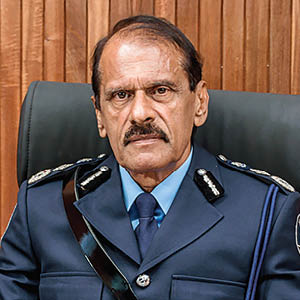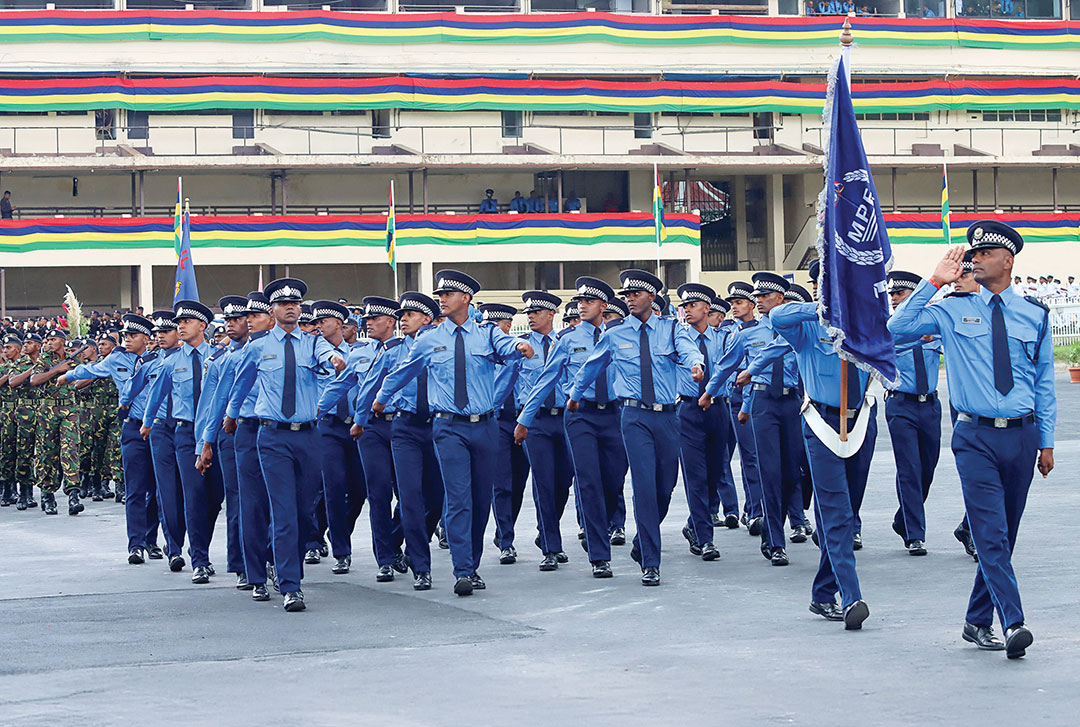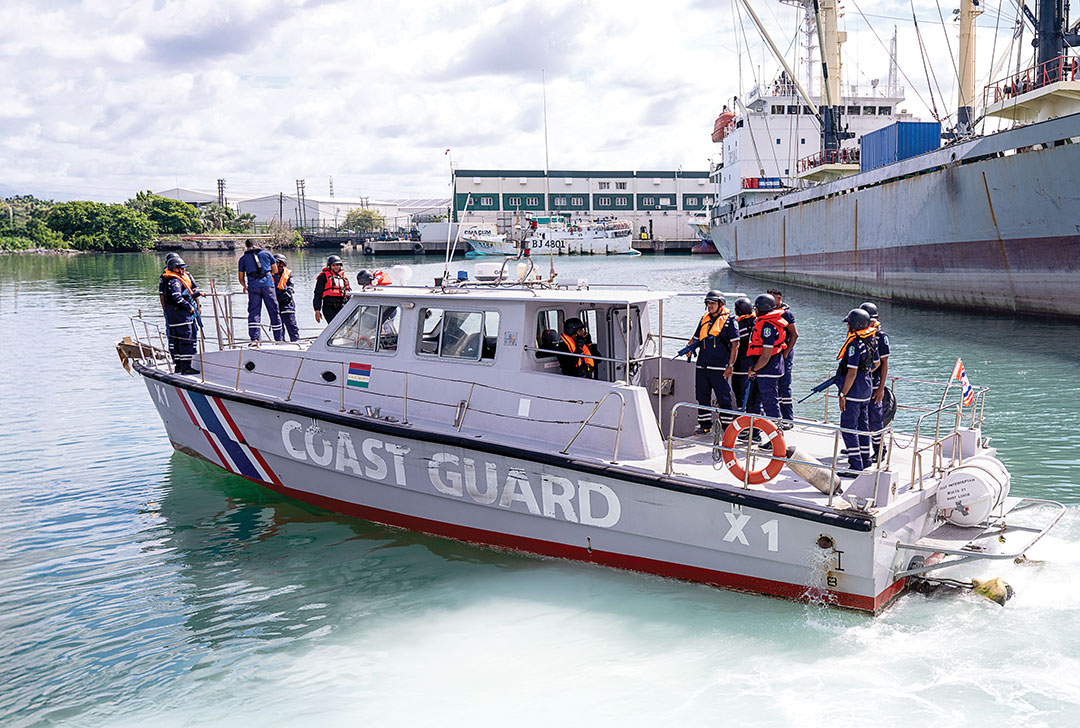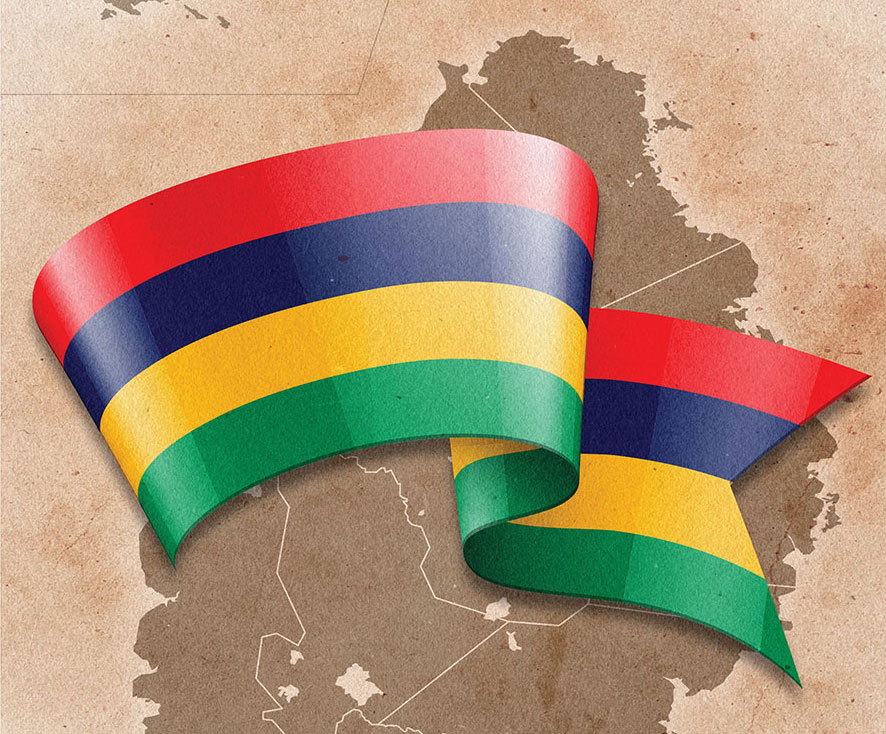 Rampersad Sooroojebally is a veteran of the Mauritius Police Force, having enlisted in 1971. Before being appointed commissioner on November 15, 2024, he played a key role in restructuring the force’s Anti-Drug and Smuggling Unit. He also designed and led the country’s Counter Terrorism Unit, which collects and analyzes intelligence before disseminating it to law enforcement. His remarks have been edited for space and clarity.
Rampersad Sooroojebally is a veteran of the Mauritius Police Force, having enlisted in 1971. Before being appointed commissioner on November 15, 2024, he played a key role in restructuring the force’s Anti-Drug and Smuggling Unit. He also designed and led the country’s Counter Terrorism Unit, which collects and analyzes intelligence before disseminating it to law enforcement. His remarks have been edited for space and clarity.
ADF: Despite its small size, Mauritius patrols an exclusive economic zone (EEZ) spanning 2.3 million square kilometers, which is roughly the same size as Africa’s largest country, Algeria. Can you describe your country’s general strategy to maximize its resources to monitor and secure this area?
Sooroojebally: As you said, Mauritius has a very large EEZ, about 1,200 times our land mass. It presents a multitude of challenges. The National Coast Guard [NCG], which is the maritime arm of the Mauritius Police Force, has the responsibility of safeguarding these maritime zones. The NCG is focused on several key areas, such as intelligence-gathering capabilities, fostering collaboration and capability enhancement. Our ability to monitor and analyze maritime activities has been strengthened to ensure that the operations are intelligence- and information-driven.
In collaboration, the NCG actively engages with domestic, regional and international maritime security agencies to share information and coordinate efforts. Domestically, it closely cooperates with units within the Mauritius Police Force, such as the Anti-Drug and Smuggling Unit and the Passport and Immigration Office, as well as external organizations like the Customs Anti-Narcotics Section, Fisheries, Tourism Authority, and Shipping and Ports Authority. The NCG also actively collaborates with maritime forces of like-minded countries as well as with multilateral organizations to detect and thwart illicit maritime activities.
Continuous investment in modern technology and equipment for the NCG has been a focus of the government. Over the years, we have acquired new ships, aircraft, high-speed boats, surveillance systems and software, which have enhanced our capacity to surveil and conduct operations effectively. We are also in the process of upgrading many of these fast-evolving technological systems, such as the coastal radar surveillance system.

ADF: How do these technological systems protect your waters?
Sooroojebally: They play a critical role in keeping our vast EEZ under surveillance and enhancing our maritime domain awareness. The NCG uses a number of tools and software to track and monitor merchant ships, fishing vessels and other vessels of interest in our maritime zone. The NCG has a multilayered surveillance approach that includes a coastal surveillance radar system, automatic identification system, or AIS, surveillance aircraft, ships and information-sharing mechanisms to monitor vessel movements in real time. We are also in the process of establishing a National Maritime Information Sharing Centre to better leverage technology and streamline the flow of information between various internal and external stakeholders to strengthen our ability to monitor our maritime zones. Adopting and absorbing technology is a continuous process, and we continue to acquire and integrate these tools to strengthen our surveillance and intervention capabilities.
ADF: Organized crime such as drugs, weapons and human trafficking are prevalent in the Indian Ocean and Mozambique Channel. What kinds of illegal maritime activities does your force deal with?
Sooroojebally: We face significant challenges, including illicit maritime activities that threaten our security, our economy and ecology. Among these, drug trafficking remains one of the most pressing concerns for the country. The harmful effects of drug trafficking extend far beyond their immediate impact, contributing to the rise of allied illicit enterprises that undermine societal well-being. The oceans continue to serve as a conduit for drug smuggling, and it has been our consistent endeavor to implement robust measures to counter this menace.
Illegal, unreported, and unregulated [IUU] fishing is another major threat. The Indian Ocean region is home to some of the world’s most vital fisheries, which support millions of livelihoods and play a critical role in global food security. Excessive and unregulated fishing can disrupt marine ecosystems, deplete fish stocks and create long-term ecological imbalances. It’s a major priority, and we work very hard to safeguard our marine resources and promote sustainable practices.
Other illegal maritime activities, such as human trafficking and unauthorized immigration, also pose significant challenges. These activities not only violate national and international laws but also endanger human lives and undermine regional stability.
The environment is another major issue because of tourism. We need people coming to Mauritius. There’s no doubt about it. We coordinate with and assist the government in keeping environmental disasters at bay.

ADF: Describe Mauritius’ relationship with India on maritime security and how that partnership has grown in importance in recent years?
Sooroojebally: Our relationship is deep-rooted and built on cultural, historical, linguistic and strong diplomatic ties. This has also underlined the maritime security partnership between the two countries. Over the years, the shared interest in ensuring safety, security and stability of the Indian Ocean region has further reinforced our cooperation and relationship. India’s initiatives such as the SAGAR [Security and Growth for All in the Region] and MAHASAGAR [Mutual and Holistic Advancement of Security and Growth for All in the Region] initiatives, which promote cooperative security and sustainable maritime development, align with Mauritius’ interests, and we hope to further strengthen this cooperation for a safe, secure and stable Indian Ocean.
ADF: How concerned are you about the millions of dollars in annual financial losses to IUU fishing, and how does that impact Mauritius’ economy?
Sooroojebally: IUU fishing is a significant threat to Mauritius. It depletes fish stocks, affecting legal fishers’ ability to catch and sell fish. It distorts market prices. It threatens livelihoods and also undermines food security. The fisheries sector provides employment to over 20,000 individuals, with the tuna industry alone employing more than 7,000 people. The depletion of fish resources from IUU activities jeopardizes our seafood export industry and undermines economic growth. To counter this, Mauritius has taken strong action, including ratifying the Port State Measures Agreement to prevent the entry of illegally caught fish into our ports. We also are strengthening our surveillance capabilities and enhancing regional cooperation to tackle IUU fishing. The blue economy has emerged as a pillar of our economic prosperity and development. Addressing the issue of IUU fishing is crucial for ensuring the long-term prosperity of Mauritius’ economy.
ADF: What needs to be done to identify and stop IUU fishing vessels? Which strategies are working best in combating IUU and other maritime crimes in East African waters?
Sooroojebally: In the fight against illegal fishing, the NCG coordinates with the Fisheries Department to monitor our waters. We conduct extensive airborne and shipborne surveillance, coupled with coastal patrols, to curb illegal fishing in the area. The efforts of the NCG have also led to the detection and prevention of illegal fishing in coastal areas and resulted in confiscation of illegal fishing nets spanning close to 6 kilometers. These kinds of actions have been instrumental in protecting our marine resources and ensuring the sustainability of our fisheries. Enhancing regional cooperation with other countries in the region which are also affected by similar issues undoubtedly makes the efforts against IUU fishing more effective. The Port State Measures Agreement has been crucial in blocking illegally caught fish from entering ports.
ADF: How beneficial have regional organizations such as the Regional Coordination of Operations Centre in Seychelles and the Regional Maritime Information Fusion Centre in Madagascar been for your work in Mauritius? How would you like to see these types of partnerships evolve and expand?
Sooroojebally: They have been vital to ensure collaboration with regional countries in the fight against illegal maritime activities. They have been able to provide intelligence, enhance situational awareness, and enable coordinated regional responses to threats like IUU fishing and trafficking. These partnerships strengthen our collective ability to monitor and protect our vast maritime zones. Moving forward, we see great value in continuing these collaborations through greater exchange of information and inclusion of more regional partners. As maritime threats become increasingly complex, these kinds of coordinated, intelligence-driven efforts are essential for ensuring collective security and stability in the Western Indian Ocean.
ADF: Mauritius hosted a large cohort of senior leaders at the African Maritime Forces Summit in June 2025. What makes gatherings like this useful?
Sooroojebally: We all want to build a more secure and stable maritime environment, so gatherings like the African Maritime Forces Summit and Naval Infantry Leaders Symposium-Africa are invaluable for fostering collaboration, sharing best practices and enhancing regional maritime security. These events bring together senior leaders, decision-makers and experts. They provide a platform for discussing emerging maritime threats such as piracy, illegal fishing and trafficking that affect multiple countries. There is a wonderful exchange of ideas on new technologies, strategies and operational frameworks. By creating a space for open dialogue, we build trust and improve coordination among African maritime forces, and we ensure that our responses to maritime security threats are more effective.

